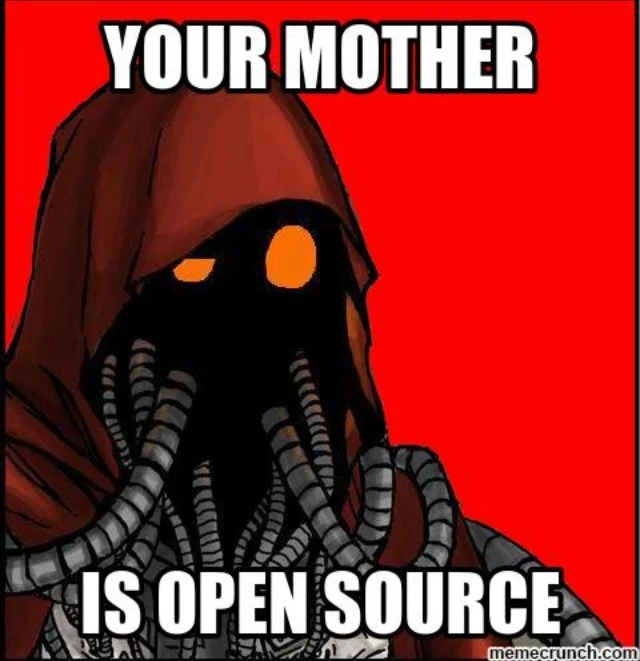Nextcloud asked in a poll at https://mastodon.social/@nextcloud@mastodon.xyz/115095096413238457 what database its users are running. Interestingly one fifth replied they don’t know. Should people know better where their data is stored, or is it a good thing everything is running so smoothly people don’t need to know what their software stack is built upon?
Mine is managed hosted so I don’t know.
I mean… I set it up many many years ago… Without looking it up I can also just guess.
That’s how I’d answer if I set something up years ago and it was stable and never required me to come tinker with it.
Not sure I understand… Can the type of database be customised during nextcloud installation? If not, then more than 37% gave a wrong answer, which is worse than the 18%?
Yes, all three are supported configurations. Technically all four, since “I don’t know” is apparently a completely valid and functional configuration too.
I did know when I set it up, but I can’t remember right now. I can easily go check though.
Yes that’s me. I have no idea what my Nextcloud uses
Every person using a computer should know what their filesystem is and what database they are using. Otherwise they are fools.
Can you believe kids don’t know what NTFS or APFS are these days?! Stupid iPad babies.
Kids don’t event know the folder struture of their Home directory, so why would they know what a File System is? Lol
Wait is APFS a new file system than NTFS? Guess I’m too busy on my Tiktoks and Nintendos to keep up to date
Apple file system
Ewww…
Look into it, it’s pretty good.
And Apple updated hundreds of millions of devices to it from an old file system without losing any data. Imagine Microsoft pulling off such a migration. It was silently done in the background with a normal OS update. Really impressive.
No, it’s garbage because of its approach to case sensitivity.
It’s case insensitive by default (which is a WTF in itself and encourages the same laziness Windows users thrive on with NTFS) but it also has a case sensitive mode.
Except the case sensitive mode is almost entirely useless because of the amount of apps it breaks that assume the default case-insensitive mode. It also means that you as a programmer have to add extra crap to your file handling code for case insensitive string comparisons if you want to support both modes
Ah that would explain why I didn’t know. I have next to no experience with Apple devices.
Damn kids with your twitternets and me mes.
Armor piercing fin stabilized.
Holy Poe’s Law…
Sir, this is a Wendy’s :)

That kid is never going to figure out if they downloaded the assignment pdf to “Downloads (iPad)” or “Downloads (iCloud)”
Haha at some point it did matter to regular folks though. I remember in Junior high when I would try to pirate games or software on Windows, I learned the big difference between fat32 and the new filesystem Microsoft released, NTFS because I couldn’t download files larger than 4GB on fat32.
I still have a FAT32 external drive that this (very) rarely still bites me 😫 there’s nothing important on it, so I’ve been lazy
It’s important if you’re using flash drives across platforms though that’s pretty rare these days too. My wife has run into this problem by formatting as ExFAT (GUID partition table) when print shops’ terrible machines only support FAT32 and/or MBR partition tables.
Thankfully macOS at home understands ExFAT otherwise those formatted drives from her Windows work computer wouldn’t even work.

At that point, were you regular folks though?
FAT32 is still a very common filesystem for flash drives and memory cards because it works on everything. Lots of people are likely to run into the 4GB file size limit.
True, I guess not. But piracy was big at that age group because we were kids who didn’t have our own money, so if our parents didn’t buy the games we wanted, people would try to download them instead. So I fell into learning this detail by necesssity instead of out of pure curiosity or desire to learn more about the computer. I wanted to download Neverwinter Nights or whatever game, and fat32 was standing in my way, haha
TIL that NextCloud can use an external database.
Are you still using sqlite?
Should’ve specifically asked the operators/hosters if they need a better answer. But this has more engagement so
That’s because they push the all in one container.
People don’t care and/or haven’t looked at the serverinfo page. That actually mentions the type of database in use.
So the “I don’t know” option was probably just the easiest.
East or West, SQLite is the best.
. >18% of people running next cloud are not backing it up.
This is a fallacious. If you have a very small set of users, what exact data is in the database that you would be upset at losing? Maybe your contacts and your calendar. Which you could back up manually, which might actually be simpler than backing up the database.
I’m sorry, but writing down the data from your organizational program and re-entering it all from scratch is NOT a backup solution.
If you have such scant data to do that, you didn’t need to have nextcould installed in the first place.
Where are you getting that from? The fastest and easiest way to back up any server is a full filesystem backup, especially if you’re using something like zfs or btrfs.
I can’t decide if you don’t know what you’re talking about or you’re just trying to troll me.
Neither, I’m trying to explain that you don’t need to know the implementation details of the software running on your server to backup the entire thing.
Honestly, does it matter to a regular user?
There will be some that do matter, if I were to run NC I would use Lite because why throw the data to another process just to write it to a disk when I only have a single node.Well it does depend on your exact use case, but using a proper database is usually the better option for production. Now if this is just some little service you made for yourself use whatever you want.
SQLite is a proper database. Realistically you’ll never exhaust its 278tb storage limits, it’s thoroughly battle tested, and it’s dead easy to backup.
I doubt nextcloud is running enough parallel db writes for this to actually matter — and if it is WAL mode is still probably good enough.
Once you have multiple software clients running then you will need a client server dbms like Postgres. For most home or group installations, this should not be an issue.
Even if you have multiple clients (most have a phone + laptop) WAL would be able to handle that easily, have you seen the benchmarks?
If you’re running it in a prebuilt container, as long as it works it shouldn’t matter and you don’t need to care.
Of course, when your database gets corrupted after Nextcloud updates because you had an app running that isn’t supported in the new version, it will suddenly matter a lot.
Will Nextcloud run apps not marked as compatible with that version?
No.
You can specify the behavior in a few places, gui, occ command, config.php. By default no, but if you have an app you want to force in regardless of the version compatibility you can make it so https://help.nextcloud.com/t/help-what-is-app-install-overwrite-for/71523
I‘m using a hosted Nextcloud instance from Hetzner and I have no idea what this is running on either. There’s a significant number of people who didn’t set up their Nextcloud instance, so people not knowing what it’s running on isn’t too surprising.
And if you don’t know what database you’re running, how are you backing it up?
If you don’t know what database you’re running, are you bothering to do a full shutdown before backups? Are you doing backups at all…
Exactly. It’s not important … until it is. :D
The poll did not ask specifically for self-hosted instances. You know you can buy hosted Nextclouds where the service provider hopefully cares for that stuff? So customers wouldn’t know which database they use. I don’t know which database my mail provider uses ¯\_(ツ)_/¯

















